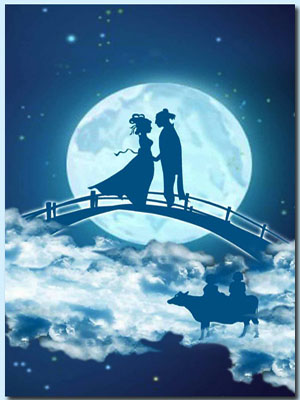Zhinü (weavergirl) is a goddess whose job is to weave colourful clouds in the heaven. One day she feels bored and decided to have some fun in earth. There, she met a Niulang, a young cowherd. They soon fell in love with each other, and decided to secretly got married without the knowledge of the Jade Emperor of Heaven.
Zhinü proved to be a wonderful wife, and Niulang to be a good husband. They lived happily and had two children. But one day the Jade Emperor found out that Zhinü, a fairy girl, had married a mere mortal. The Emperor was furious and ordered Zhinü to return to Heaven. On Earth, Niulang was very upset that his wife had disappeared. Suddenly, his ox began to talk, telling him that he was actually a deity, and if he killed him and put on his hide, he would be able to go up to Heaven to find his wife. Crying bitterly, he killed the ox, put on the skin, and carried his two beloved children off to Heaven to find Zhinü.
The Jade Emperor discovered this and was very angry. Using his power, the Jade Emperor scratched a wide river in the sky to separate the two lovers forever, thus forming the Milky Way between Altair (represent Niulang) and Vega (represent Zhinü). Zhinü must sit forever on one side of the river, sadly weaving on her loom, while Niulang watches her from afar while taking care of their two children. Feeling pity for them, Jade Emperor ordered that once a year, on the seventh night of the seventh moon, all the magpies in the world will fly up into heaven to form a bridge over the star Deneb in the Cygnus constellation so the lovers may be together for a single night.
To celebrate this romantic legend, on the seventh night of the seventh moon, young girls will go to the local temple to pray to Zhinü for wisdom, burned paper items as offerings, they may also recite traditional prayers for dexterity in needlework which symbolize the traditional talents of a good spouse in traditional Chinese culture, and make wishes for marrying someone who would be a good and loving husband. This legend also inspired Tanabata Festival in Japan and Chilseok Festival in Korea.
Thanks for reading, folks. I've heard this legend ever since I was small and I've read about it in many books and literatures. But still, I'm curious, how did modern Chinese society celebrate this festival? Because this festival always come on summer holiday and I always go back to my country during that time, hahaha.
ChinaDaily friends, can you tell me?







Comment